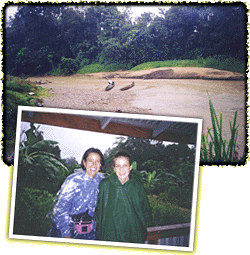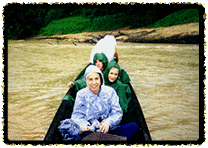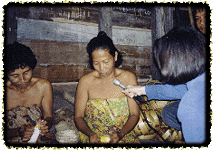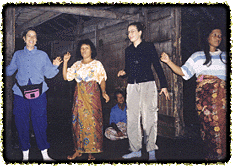 |
 |
 |
|
|||
|
Journey to Borneo
Judith: It's 95 degrees and the rain is torrential here at the muddy edge of the Lamanak river. But that hasn't stopped the mosquitoes from buzz bombing under the sweaty edge of the hood of my plastic poncho. Those insects unfortunate enough to land are now stuck in the gum of perspiration and insect repellant on my forehead. We've just driven five hours along the only paved two lane road in Borneo, a long slash of blacktop between the jungle and the sea.. Our guide, Zain, an Iban tribesperson himself, has used the time well, prepping us for the visit. Zain: The python we find here in the jungle can grow up to ten meters. It's body is very beautiful. It is the biggest enemy of the Iban people. If we find it we kill it with our knife and we cook it. Mmm. Very good. Judith: "Mmm," I say, but I think to myself: Have I made a mistake coming here to a land of 1500 parasites, Japanese encephalitis, peculiar and unrefrigerated foods? Will it be worth the thousands of miles and the 27 hours crammed inside an airplane? Am I needlessly exposing myself and my only child to health and safety risks? All for the sake of finding a mother/daughter bonding moment that takes place outside of a shopping mall? And I don't mean to be rude, but at this moment it's not a snack of python Devorah and I are longing for. It's perhaps a few moments of rest before heading out on the churning river below. And while I am extraordinarily grateful to be here, at this very minute, I am positively comatose for lack of an espresso and I may not be able to see two feet in front of me because of the downpour, but it is brilliantly clear, I am not likely to run across a cafe on the river we are about to head out on.
The Lamanak river is muddy and twisted. Huge trees drip vines over brown eddies. We veer sharply back and forth from one side of the river to the other, we dodge rocks, fallen trees, floating branches small rapids . Some sections are so suddenly shallow we have to yank the motor up, and pole madly. The Iban call the Lamanak a five-night river. Five days and nights to go the length. For us it will be a one-hour river..."if we live," Devorah reminds me. We will. The longhouse is around the next turn and just a twenty foot, slippery, steep embankment between us and it. As we glide around the next turn, we watch as tiny figures become full-size humans. Women and men are walking out of the jungle into a clearing around a low long wood and bamboo building. They have straw baskets on their backs full of green bushy things, which I am told will be our supper. There may be turtle or other meat snagged with a blow gun or sliced and diced with the parang (the long daggers hanging from the men's waists). If getting in and out of the two-foot wide sliver of boat in the mud was a challenge, getting up to the veranda of the 90-foot longhouse is another.
At this moment, I quite appreciate my daughters fashion sense and am thinking some spiky heels might just give me the kind of grip I need here to avoid an impromptu visit to the pigs below. We step right into the half light of a late afternoon coffee klatch: babies hanging in hammocks from the rafters, elderly people dozing on straw mats beside young, and middle aged women weaving, sorting brownish, thumb-size wild berries and plucking corn kernels from dried cobs. For a second, I flash on my cyberstressed daily routine, which is about one river and several oceans away from here. I imagine the phones, faxes, e-mail, doorbell ringing, beeping, whining, buzzing, and alerting no one in my empty home and office. Depooah has read my mind. Depooah: All the time of day is the same to us. Time is not important to us. Early in the morning we wake, feed the chickens, etc. We start to clear and plant rice for the season. Judith: And what about you they ask? How come I still have my teeth. Why isn't my daughter married yet? And would I please explain how I get their voices to come out of my tape recorder. I'm stuck on all counts. The conversation switches to seeds, and did I bring any, and what kind do I plant where I live, and would I like to see the rest of the house? Depooah: As you can see in front of you this is the skull see in here. We smoke it and keep it inside the basket. See, there are six here, six trophies, the chief has more... Judith: I knew ahead about the human skulls -- the net bags of family heirloom -- enemy heads taken in politics and war regularly before the 1960's. I knew the Iban, my lovely hosts, had been headhunters. What I didn't know was the exact intercultural protocol about bringing up this most remarkable fact...but I'd soon find out. I see the chief's door, a ragged poster of a Philippino cover band, an electric wall clock with a cord to nowhere and a huge shield on the wall. First the Shaman, a stringy tattooed fellow in a twist of sarong and a faded Lacoste shirt emerges. He's smoking a cigar. The chief is wearing a once stylish golf shirt and cutoffs. The holes in his lengthy earlobes are big enough to slip my Bic pen right through. Like the Shaman, he too is drenched in blue tattoos from his flip flop adorned feet to his chin.
I'm exhausted. The rain, the rapids the river, the crowing and the non-stop chatting of my wonderful hosts. But the night is young for the Iban. They're the original party animals -- especially when loopy tourists from other lands bumble out of the jungle. We couldn't refuse the cups of fermented rice drink and their insistence we sing and dance too. I'd prepared THE SONG, "Michael, row your boat a shore, hallelujah," but my plan dissolved as I was yanked up on the dance mat to join the women of a certain age in a dance that involved some tiptoeing combined with a languorous baby bird kind of hand flapping. There I am in my overpriced nylon-velcro-waterproof-never-wrinkle-dry-in-30-seconds jungle, trek outfit. My hosts are clad in a combination of traditional fabrics and Woolworth Christmas decoration outfits. Devorah, as befitting a 16 year old, was burning with embarrassment at my performance. That is until the Longhouse teen set got her dancing too. I did my age appropriate thing too...I beamed. I watch while five dancers do a headhunting dance, which I am assured doubles as a welcome dance. It looks pretty traditional to me. Then the chief confides he is worried. Chief: I'm not sure of the changes...in the future. If I may die, I don't know what may happen. Judith: I see the changes to which the chief refers. There's a small, humming generator that can power a light in case a river doctor has to come for a medical emergency and a couple of gasoline chain saws. The chief is also worried that full body tattoos have lost their cache. Tattoos are the Iban's most profound sign of manhood, and in spiritual terms serve as an actual torch, an illumination to make ones way into the dark after death, but as the Chief's son tells me, tattoos no longer get the girls. But hospitality, a tradition that has outlived even headhunting is alive and well. "We like visitors to come. When visitors come we have dancing, rice wine, food freely offered...we will slaughter a chicken." Judith: And that's just the beginning. The party will go on all night. You will drink a lot to make your hosts happy. They will tell stories, and you will be called on to tell your tale, sing your song, or even show your own tattoos. Even when the Iban finally fall asleep, the jungle is noisy. We sleep badly but happily under a splash of torn mosquito netting. We'll go back. We'll stay longer but before we do that, I'll think a lot about, and try to answer the Chief's questions -- not just for him, but for myself. How big are the trees in my country? Where do the fish go when the river freezes over? How does my tape recorder actually capture voices? And is the chief of my government a good man? In Sarawak Malaysia on the island of Borneo, I'm Judith Ritter for the Savvy Traveler. Here's some information to get you started on setting up your own journey to Borneo.
|
 | American Public Media Home | Search | How to Listen ©2004 American Public Media | Terms of Use | Privacy Policy |




